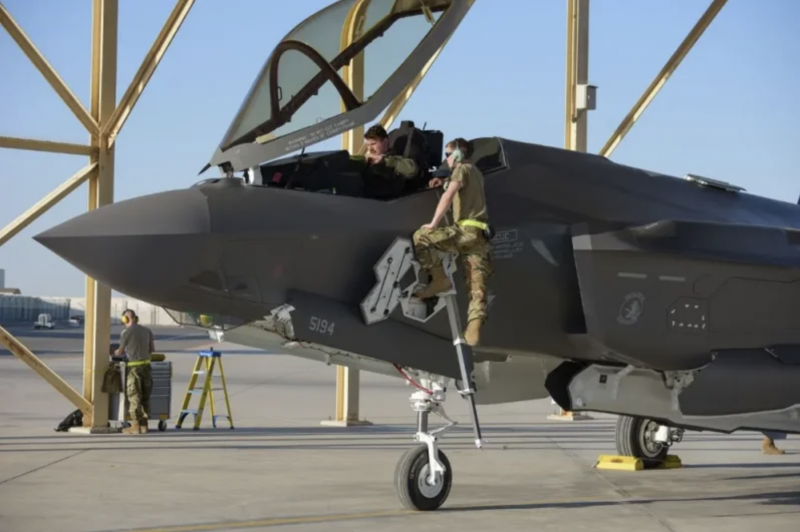
American soldiers on a latest-generation F-35 fighter jet, stationed at al-Dhafra base in the United Arab Emirates. (Credit: US CENTRAL COMMAND (CENTCOM)/AFP)
An Emirati official justified to the Wall Street Journal (WSJ) Abu Dhabi’s recent decision to impose restrictions on the military air missions that the US conducts from its territory against targets in Iraq or Yemen as “self-protection."
Since February, the UAE has required that the US obtain prior approval before carrying out attacks from aircraft based at Al-Dhafra near the Emirate capital, the WSJ revealed.
According to the WSJ, the Pentagon recently moved fighter jets, reconnaissance drones and other weapons to Al-Udeid base in Qatar, though it is unclear how many. This is a way for Abu Dhabi to avoid becoming a retaliatory ground for the Iran-aligned groups that the US targets, at a time when the UAE wants to maintain relative stability to diversify its economy.
‘Zero problems’
While Abu Dhabi has forged closer ties with Tehran — with which it resumed talks a few years ago following the absence of any US reaction to the Houthi attack on Aramco’s oil facilities in Saudi Arabia in September 2019 — trust is far from being established between the two countries.
As a signatory to the Abraham Accords on Arab-Israeli normalization, the UAE is said to have indirectly contributed to the interception of Iranian missiles that were launched at the Jewish state on the night of April 13-14, by passing on information to the US.
It is a means of preventing a regional conflagration, but also a reminder of the fear inspired by the Islamic Republic and its network of affiliates in the UAE.
Now a proponent of a “zero problems” policy motto, after many years of involvement in wars through proxy groups, Abu Dhabi is nonetheless pragmatic, reaching out to both Bashar al-Assad and, more recently, to Hezbollah.
The UAE is also diversifying its partnerships to signal its continuing dissatisfaction with Washington. Traumatized by the Aramco episode, the Emiratis still blame the Americans for not reacting as they wished to the Houthi strikes that hit Dubai and Abu Dhabi in early 2022.
A few days after the second attack, US representatives sent the Emirati military a bill for refueling their planes, which were then permanently deployed over the territory to intercept projectiles from Yemen.
This gesture outraged current president Mohammed bin Zayed, and relations with Washington were at an all-time low.
With Russia’s invasion of Ukraine a few weeks later, the UAE has also become a place of refuge and investment for many Russian oligarchs under Western sanctions, while trade relations between Abu Dhabi and Moscow have grown to over $9 billion by 2022.
That has upset the White House, which regularly sanctions UAE-based companies suspected of helping Russia circumvent US restrictions.
Qatar as an alternative
The UAE’s decision in February to ask Washington for authorization to carry out strikes against Iran-aligned groups can certainly be seen as a gesture towards Tehran. However, Abu Dhabi does not seem ready to break with its US ally, who is the only one who can force Israel’s hand in its conduct of the Gaza war, which will soon enter its eighth month and still threatens to inflame the region.
Keen to contain regional crises amid the presidential election campaign, US President Joe Biden seems inclined to accept the diversification of partnerships of his Gulf allies, while laying down some red lines.
The talks between the UAE and Ukraine to establish a free-trade agreement were concluded on April 29 and the rupture of economic ties between the UAE’s AI firm G42 and its Chinese supplier earlier in December are signals underscoring the US’s strategic importance for the UAE.
Washington remains Abu Dhabi’s main arms supplier, accounting for nearly 60 percent of these imports between 2019 and 2023, according to a Stockholm International Peace Research Institute study.
Faced with the balancing position of the UAE ally, the White House quickly fell back on Qatar to send its planes and drones. This is despite that the US is likely to withdraw the aircraft carrier USS Dwight D. Eisenhower from the region by the summer, and may not replace it, US officials told the WSJ.
The military vessel’s mission includes creating deterrence while protecting commercial vessels from Houthi attacks, as well as carrying out strikes against the rebel group’s interests in Yemen.
The latter objective could now be conducted from the Al-Udeid base in Qatar, which has imposed no restrictions on US strikes, but also from Djibouti, on the Red Sea, where US soldiers maintain a presence, the WSJ reported.
A major non-NATO ally of the US, Doha is an essential partner for Washington, playing a key mediation role, particularly since Oct. 7.
The White House even recently asked Qatar to expel Hamas — which set up its political office in the Qatari capital back in 2012 — if the Palestinian movement refused the latest truce and hostage release offer that Egypt put forward and the Israelis amended.
Qatar said it is ready to fulfill this demand if need be, thus increasing the pressure on the Islamist group. On Monday evening, Hamas said in a statement that it accepted the cease-fire offer put forward by the Qatari and Egyptian mediators.
This article was originally published in L'Orient-Le Jour. Translated by Joelle El Khoury.